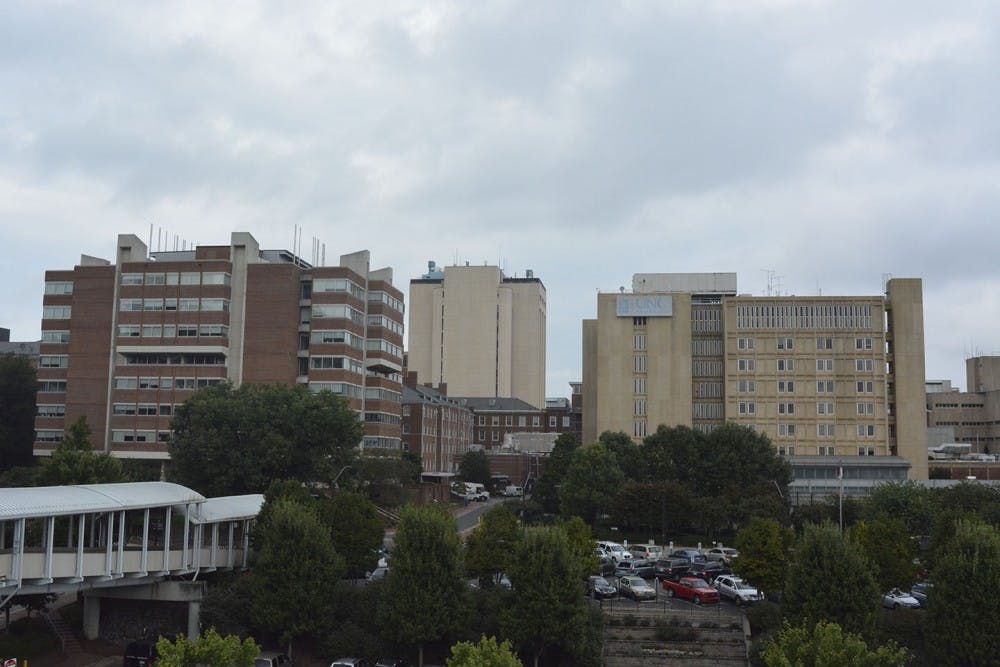Hurston said with the growing locations, the system also needs more health care providers. He said UNC Hospitals alone employs more than 8,000 people.
There are certain regulations hospitals must meet and costs associated with them, Hurston said, which means it can make more financial sense to join a large health care system, like UNC Health Care. Sharing functions, such as IT, human resources and suppliers, can cut down on costs.
“(Meeting regulations) is a very costly proposition and not all hospitals can afford it, so if they can connect with other places and help share, to the degree possible, some of those resources, that can reduce cost as well,” Hurston said.
Caring for the state
Over his almost 30-year career, Hurston said he has witnessed the health care industry change, and he thinks the industry is now headed in a direction toward larger networks instead of many independent hospitals.
“We are sharing information,” Hurston said. “We’re learning things together and we’re implementing things that are used in other industries as well as best practices.”
Kenji Brantley, system director of strategic planning for UNC Health Care, said part of his job is understanding and planning for the changes in health care across North Carolina.
“You’ve got an aging population that is increasingly sick or has different health challenges,” Brantley said. “You have a growing population. You have changes in how hospitals and doctors are paid for the care they provide. You also have an increasing focus by everyone to provide care better, with a higher quality at a lower cost in a way that creates wellness and just well being for the patients.”
Brantley said the growing network of UNC Health Care has allowed them to change how they help people and provide care. He said UNC Health Care isn’t waiting for patients to come to them — they have worked to increase accessibility for citizens across the state.
“We have this network now across the state where patients who live in rural North Carolina communities — who may otherwise not have access to cutting edge cancer care or a renowned vascular surgeon or may not be able to access those types of physicians — well, they now through their local community hospital may have a much better connection to some of the more complex care that we can provide here in Chapel Hill,” Brantley said.
Brantley said it has become increasingly important for physicians to be available where people are, where they work and go to school.
He said UNC Health Care has felt pressure to be in more locations, which led to the opening of the Hillsborough branch of UNC Hospitals, renovation at the Family Medicine Center and the establishment of the UNC Health Alliance.
To get the day's news and headlines in your inbox each morning, sign up for our email newsletters.
He said the UNC Health Alliance is a network of over 3,500 health care providers who work to coordinate care for patients around North Carolina.
Brantley said medicine is changing to become more community-based and outpatient-focused. He said health care can work better in a community where people have direct access to health care and can get help before they need to come to a hospital.
“If we’re doing that and we’re keeping people healthy, then I think that is certainly the biggest win,” he said.
Hurston said funding for UNC Hospitals’ projects comes from revenue from operations and occasionally a bond.
“We then have to note our plan to accommodate that growth,” Hurston said. “We have to know how we’re going to pay for it. We have to know how we’re going to accommodate them.”
Hurston said the process of expansion can become more complex if fulfilling health care needs requires a new building on the hospital’s main campus or an addition to an already existing building.
In that case, the hospital has to evaluate how construction affects taxes and traffic patterns in Chapel Hill — but Hemminger is already trying to solve the latter issue.
“We are always looking to see how we can improve our transit system to go to the places people need to get to for jobs, for appointments, those kinds of things,” she said.
@jamielgwaltney
university@dailytarheel.com




